Leak testing of medical-pharmaceutical vials through laser drilling ensures the tightness of entire product groups.
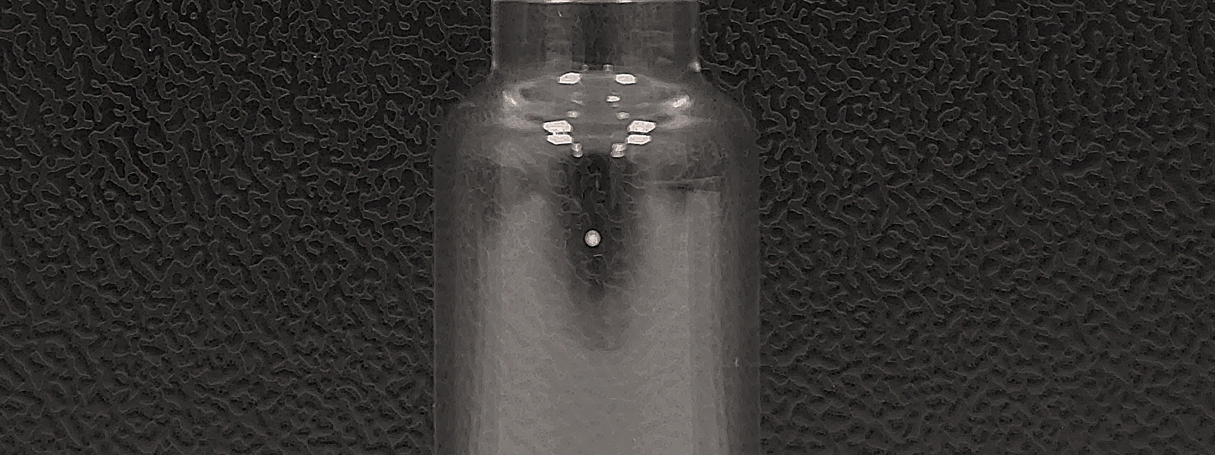
To ensure access to high-quality and safe medical and pharmaceutical equipment in the future, innovative solutions are needed for rapid and cost-effective testing of the required hygiene and quality standards. During the manufacturing and processing of products such as syringe cylinders, vaccine vials, or infusion and transfusion bags, various quality and stability tests are already conducted. The control mechanisms used must reliably detect even the smallest changes and damages in the material to exclude contaminations during application. For this purpose, GFH GmbH offers medical and pharmaceutical manufacturers a laser-based solution. By drilling highly precise leak holes with diameters ranging from just 5 µm to 50 µm into individual items on a production line, a cost- and time-saving option for validating these quality tests is provided, which is particularly flexible and gentle on materials. While bore dimensions can be maintained very precisely, no cracks or stresses are generated in the material around the borehole.
As a result of the ongoing pandemic, the demand for so-called "leakage holes" in syringe cylinders is rapidly increasing. These intentionally placed probes aim to eliminate material defects in vials and cylinders during manufacturing to prevent potential contamination of transfusions or leakage during application. The increasing demand for such inspection methods can be attributed, not least, to the global vaccination campaigns and the consequent increased demand for flawless medical and pharmaceutical products. Manufacturers thus require reliable methods that can perform sample-based quality inspections in a time- and cost-saving manner with high precision. Laser technology is a predestined method for this purpose due to its very precise and non-contact processing beam, which is why several renowned manufacturers have already turned to GFH GmbH for the production of leakage holes.

Drilling highly precise leak holes in individual items on a production line provides a cost- and time-saving method for validating the control mechanisms used in manufacturing.
The laser experts have developed a process that allows for the drilling of highly precise leak holes to validate the control mechanisms used in production without significant effort. The resulting (flawed) products with micro-drilled holes are then deliberately integrated into the manufacturing process of medical product manufacturers. These "prepared" products then form the control group for quality and leak testing. "The ultra-short pulse laser serves as an excellent tool to provide the glass vials with leakage holes that are very small and precise, yet do not damage the material around the borehole," explains Andreas Reitberger, Sales Director at GFH GmbH. "There are several reasons for this: Firstly, the ultra-short laser pulses that impact the material prevent stresses and cracks in the material through so-called 'cold ablation'. Secondly, there are no limits to the variety of materials that can be processed with laser technology. Thus, even difficult-to-machine materials such as glass or special medical plastics can be processed with high precision."
For the process application of the leakage bores described earlier, the laser beam is positioned on the workpiece via two mirrors with a scanner. Since only small masses need to be moved through these optical axes, highly dynamic and flexible machining is possible. The laser beam is focused onto an extremely small area, allowing for the production of bores with minimal diameter (lower limit 5 µm). Laser machining also does not result in tool wear, making the machining repeatable at any time. Additionally, post-processing is eliminated in laser microprocessing. "With this technology, the manufacturer benefits from the micrometer-precise adjustment of the bore and the virtually unrestricted flexibility of the laser," Reitberger adds.
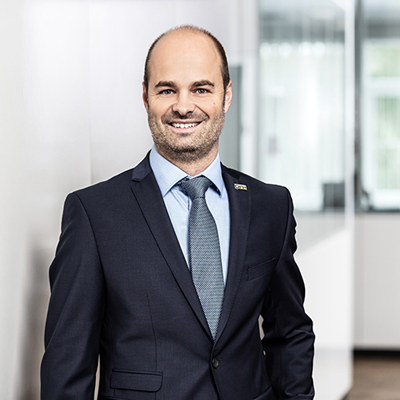
"Andreas Reitberger, Head of Sales at GFH GmbH, explains, 'The ultra-short pulse laser serves as an excellent tool for providing glass vials with leakage holes that are very small and precise, yet do not damage the material around the borehole.'"
The medical-pharmaceutical glass containers typically have a wall thickness of only one millimeter. Depending on customer requirements, the highly precise percussion bores have a diameter ranging from 5 µm to 50 µm. With a tolerance of just +/- 2.5 µm, the bores demonstrate extreme accuracy, which would be hardly achievable with conventional mechanical drilling methods. Based on the highly accurate measurement methods used at GFH using optical microscopes, a test protocol is created for each individual borehole following the laser processing, ensuring that each hole is precisely certified and validated.
In addition to machining, products, especially in the medical and pharmaceutical fields, need to be precisely labeled or marked for subsequent certification and traceability. Conventional machining methods often require multiple machines for this task, as the workpiece needs to be clamped onto different machining machines several times. However, with laser processing, multiple clamping operations are eliminated. In this modern processing method, both drilling and marking can be performed in a single operation. Combining these two processing steps saves significant time and setup costs.
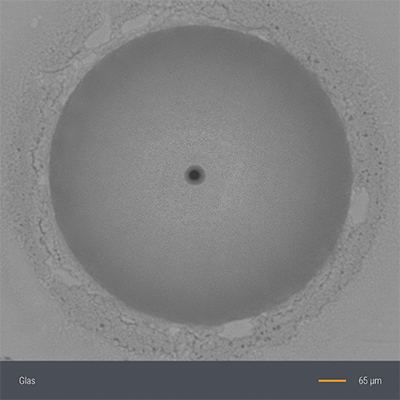
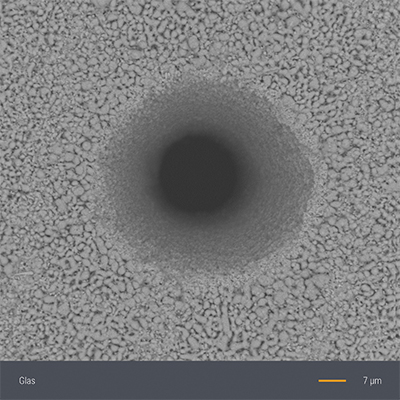
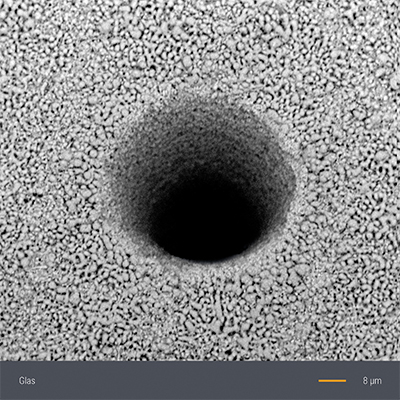
Scanning electron microscope image of the leakage bore created by the ultra-short pulse laser in a glass vial (side view of a 20 µm bore).
GFH's extensive expertise in laser microprocessing and in the construction of production machines allows the company to manufacture or process these particularly demanding products for manufacturers in the pharmaceutical-medical technology sector in-house. Furthermore, the company even develops its own laser systems according to specific requirements if requested. "If a customer expresses a specific need for such a machine, we work together to select the appropriate GFH production model and equip it with modular hardware and software solutions for the specific application," explains Reitberger. All GFH production machines are equipped with ultra-short pulse lasers from renowned manufacturers. During this consultation, technicians also provide information on possible custom solutions and other processing methods that can be implemented in the systems – from laser cutting to laser ablation and laser turning. "We are pleased to have been able to support many renowned manufacturers in securing their supply chains with our established drilling process for leakage holes in syringe cylinders in response to short-term special requests. Drilling leakage holes with ultra-short pulse lasers in syringe cylinders has become a mainstay in our precision manufacturing," concludes Reitberger.